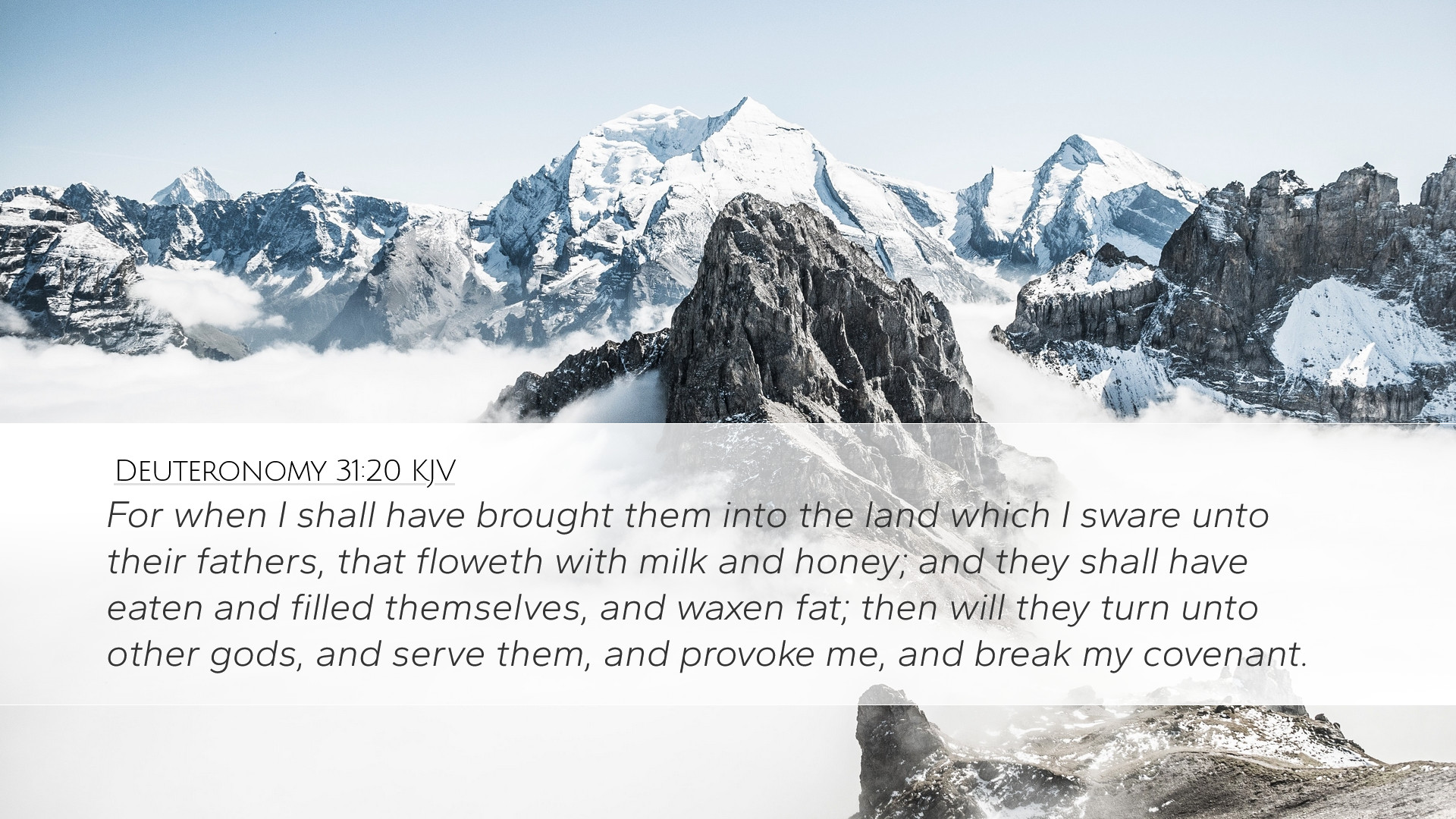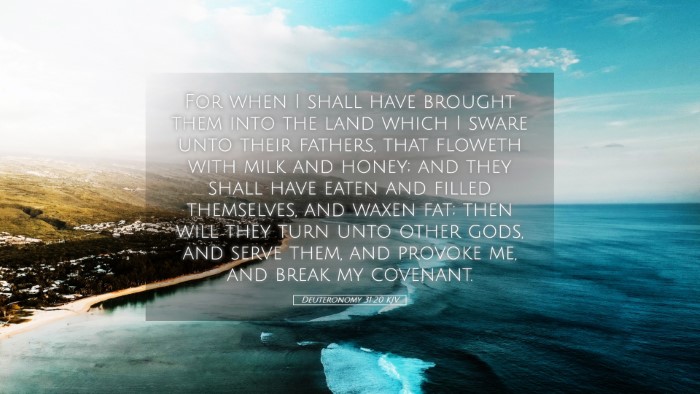Commentary on Deuteronomy 31:20
Bible Verse: "For when I shall have brought them into the land which I sware unto their fathers, that floweth with milk and honey; and they shall have eaten and filled themselves, and waxen fat; then will they turn unto other gods, and serve them, and provoke me, and break my covenant."
Introduction
Deuteronomy 31:20 encapsulates a significant moment in the narrative of Israel's journey from slavery to the Promised Land. This verse reveals God's foreknowledge and concern regarding the spiritual fate of His people. In this commentary, insights from Matthew Henry, Albert Barnes, and Adam Clarke will illuminate the gravity and implications of this passage for contemporary readers, including pastors, students, and theologians.
Contextual Analysis
This verse falls within a critical framework where Moses is preparing to hand over leadership to Joshua, as the Israelites prepare to enter Canaan. It is essential to recognize the overarching theme in Deuteronomy, which emphasizes covenant faithfulness and the consequences of disobedience.
Historical Background
Moses, the lawgiver, conveys not only historical accounts but also admonitions, reflecting God’s covenant with Israel. In their journey through the wilderness, Israel experienced God's provision and guidance, yet the text indicates a foreboding shift that will occur once they attain the stability of the Promised Land.
Thematic Insights
Divine Promises and Warnings
Matthew Henry emphasizes the dual nature of God's relationship with Israel, portraying Him as both a benevolent provider and a divine judge. The "land that floweth with milk and honey" represents not only physical abundance but also a spiritual oasis where Israel can thrive. Yet, with abundance comes temptation, a recurrent theme throughout Scripture.
Prosperity and Spiritual Deterioration
Albert Barnes notes that the inevitable prosperity of Israel poses a significant threat to their faithful adherence to Yahweh. The danger lies in the tendency of the blessed to forget their Benefactor and turn away toward idolatry. Barnes highlights that this pattern of ingratitude results in broken covenant relations, emphasizing that prosperity should lead to thanksgiving and spiritual vigilance, rather than complacency.
The Consequences of Idolatry
Adam Clarke articulates the serious consequences of turning to other gods. He reflects on the spiritual ramifications for Israel, suggesting that such actions not only provoke divine anger but also lead to national catastrophe. Clarke’s commentary serves as a stark reminder that faithfulness to God demands not only initial devotion but a sustained commitment amidst the trials and distractions of life.
Lessons for Today
Faithfulness Amidst Blessing
The modern believer can glean vital lessons from Deuteronomy 31:20 regarding the need for vigilance in faith during prosperous times. Just as Israel faced the risk of abandoning their covenant amidst abundance, so too can contemporary Christians struggle to maintain focus on their relationship with God when life becomes comfortable.
The Importance of Remembrance
One of the significant takeaways from this passage is the importance of remembrance and gratitude. Regular reflection on God's past faithfulness is crucial for today’s believers to encourage steadfastness and ward off the allure of distractions that may lead them astray.
Community Accountability
Moreover, the principle of accountability within the faith community becomes vital. Just as Moses warned the Israelites collectively, the church today should foster an environment where believers can support one another in their spiritual journeys, ensuring that individual and communal faith does not wane in the face of success.
Conclusion
Deuteronomy 31:20 serves as a sobering reminder of the human propensity to stray from God, particularly when blessed. Through the insights of beloved theologians like Henry, Barnes, and Clarke, the text presents a profound warning urging continuous faithfulness and careful stewardship of God's blessings. As believers engage with this scripture, they are called to maintain a posture of humility and gratitude, remaining vigilant against the temptations that come with prosperity.
Reflection Questions
- In what ways can we ensure that our gratitude for God's blessings leads us closer to Him rather than away?
- How can church communities foster accountability to resist the temptations that come with material success?
- What practical steps can individuals take to regularly remember and recount God’s faithfulness in their lives?


